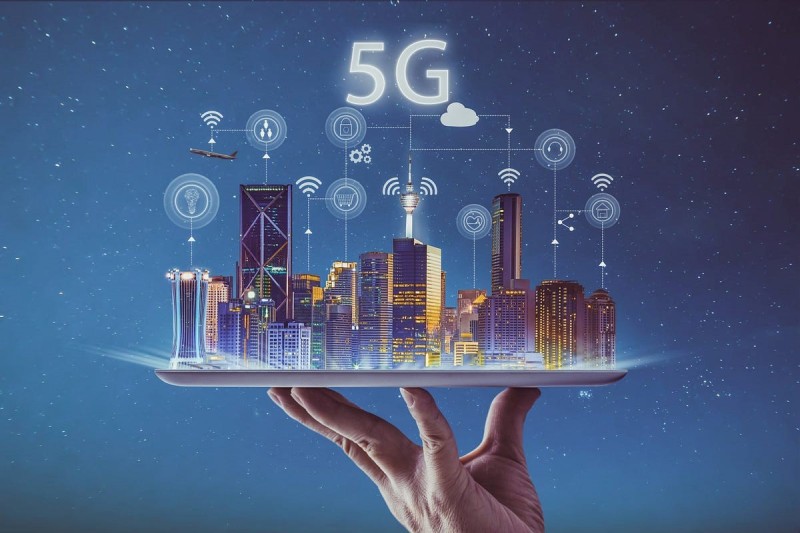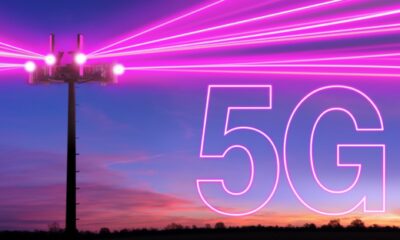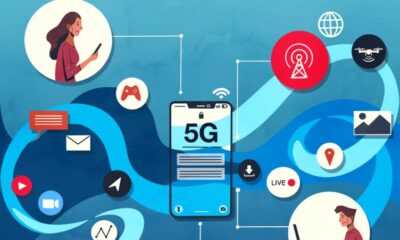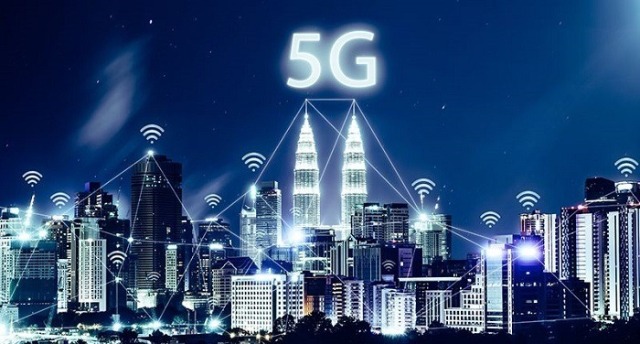Tech
5G Technology: The Impact on Communication and Industry

The advent of 5G technology marks a significant leap forward in the realm of telecommunications, promising to revolutionize how we communicate and conduct business. With its unparalleled speed, low latency, and capacity to connect a vast number of devices, 5G is set to have a profound impact on various sectors, reshaping industries and enhancing everyday experiences. Transforming Communication At the core of 5G technology is its ability to deliver data at unprecedented speeds, up to 100 times faster than 4G. This translates to seamless streaming of high-definition videos, rapid downloading and uploading of large files, and virtually lag-free video conferencing. For consumers, this means enhanced mobile experiences, from gaming to virtual reality applications, all accessible with remarkable fluidity. Moreover, 5G’s low latency— the time it takes for data to travel from one point to another— is a game-changer for real-time communication. Video calls will become more reliable, with minimal delay, providing a more natural conversational flow. This is particularly beneficial for remote work and online education, where clear and consistent communication is paramount. Revolutionizing Industries Beyond personal communication, 5G is poised to revolutionize industries by enabling new levels of connectivity and automation. One of the most significant impacts will be seen in the manufacturing sector.
The integration of 5G with the Internet of Things (IoT) will facilitate smart factories, where machinery and equipment can communicate in real-time, optimizing production processes and reducing downtime. Predictive maintenance, powered by data from connected devices, will minimize equipment failures and enhance operational efficiency. The healthcare industry stands to benefit immensely from 5G technology. Telemedicine, already on the rise, will become more effective with higher-quality video consultations and the ability to transmit large medical files swiftly. Remote surgeries, using robotic systems controlled by surgeons in different locations, will become feasible due to the low latency of 5G, potentially saving lives in emergency situations. The transportation sector will also experience transformative changes. 5G will be instrumental in the development and deployment of autonomous vehicles, providing the necessary infrastructure for vehicles to communicate with each other and with traffic management systems. This will improve road safety, reduce traffic congestion, and pave the way for more efficient public transportation systems.
Enhancing Consumer Experiences For consumers, 5G will unlock new possibilities in entertainment and daily conveniences. Augmented reality (AR) and virtual reality (VR) applications, which require high bandwidth and low latency, will become more prevalent and accessible. This will enhance experiences in gaming, shopping, and even social interactions, as virtual environments become more immersive and realistic. Smart homes will become smarter with 5G, as more devices can be connected and controlled seamlessly. From smart thermostats and security systems to refrigerators that can order groceries automatically, the integration of 5G will make home management more efficient and intuitive.
Economic and Social Implications The rollout of 5G technology also carries significant economic implications. It is expected to create new business opportunities, drive innovation, and stimulate economic growth. According to a report by the World Economic Forum, 5G could add up to $13.2 trillion to the global economy by 2035, creating millions of jobs in the process. However, the deployment of 5G is not without challenges. The infrastructure required for widespread 5G coverage is extensive and costly, involving the installation of numerous small cells and upgrading existing networks. There are also concerns about cybersecurity, as the increased connectivity of devices presents more opportunities for cyberattacks. Addressing these challenges will require collaboration between governments, industry stakeholders, and technology providers.
In conclusion, 5G technology represents a monumental advancement in communication and industry, with the potential to transform how we live and work. Its impact will be felt across various sectors, from healthcare and manufacturing to transportation and entertainment. While there are challenges to overcome, the benefits of 5G promise to usher in a new era of connectivity and innovation, driving progress and enhancing our daily lives. As the world embraces this new technology, the future of communication and industry looks brighter than ever.
Swati
Assistant Professor
Chandigarh University
-

 Business2 weeks ago
Business2 weeks agoNayef Doleh Examines International Humanitarian Fundraising Strategies
-

 Business3 weeks ago
Business3 weeks agoHow Black Banx is Redefining Global Banking Strategies in 2025
-

 Business2 weeks ago
Business2 weeks agoHow to fill MSME Form 1? Step-by-Step Guide
-

 Tech4 weeks ago
Tech4 weeks agoHow to Switch Between Microsoft Teams and Skype, How To Export Messages, Files, and Contacts from Skype Before It Shutting Down
-

 Tech3 weeks ago
Tech3 weeks agoMicrosoft Teams to End SMS Messaging Feature Support for Android Phones and Switch to Phone Link App as Alternative
-

 Business4 weeks ago
Business4 weeks agoPurpose of the AIRdiamond Project
-

 Education3 weeks ago
Education3 weeks agoSchool Of Odd Thinkers – Think Odd, Learn a lot, and Earn a lot
-

 Startup4 weeks ago
Startup4 weeks agoFrom Trends to Sales: How Small Businesses Can Capitalize and Maximum Reach on Social Media

















